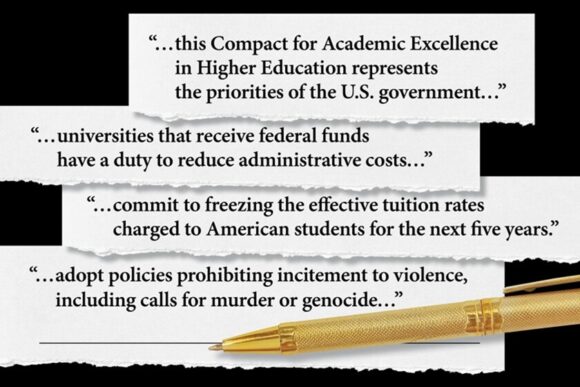Illustration by The Chronicle of Higher Education: Getty Images
Dear Commons Community,
The Chronicle of Higher Education is reporting that, according to multiple sources, the president of Dartmouth College, an initial recipient of the Trump administration’s much-debated “compact” for higher education, has told faculty members that she will not endorse the current version of the agreement,
The sources, who asked to speak anonymously to describe internal decision-making, said they participated in a meeting with President Sian Leah Beilock in which, as one of them put it, she said “she would not sign the compact as written.”
“She was very firm and clear on that, but it also had that very clear ‘as written’ part attached to it,” said that faculty member.
A Dartmouth spokesperson, Jana Barnello, told The Chronicle that Beilock “has been meeting with faculty across the institution to solicit their input and is looking forward to providing feedback to the White House, as requested,” and referred to Beilock’s October 3 message to the college community.
Meanwhile, the circumstances surrounding the compact are changing rapidly. On Friday, Sally Kornbluth, president of the Massachusetts Institute of Technology, posted a statement saying that her institution “cannot support the proposed approach to addressing the issues facing higher education.” And on Tuesday, The Chronicle confirmed that a post from President Trump on Truth Social was intended as an invitation to “any institution” to sign on to the deal.
The administration had given the original nine institutions that received the compact until October 20 to deliver “feedback” on the document, which promises signers preferential treatment in taxes and federal funding, in return for commitments in admissions, hiring, institutional neutrality, and other areas, to be enforced by the Department of Justice.
The compact generated immediate opposition across higher education, although some stakeholders in academe aren’t opposed to all of its terms. Critics have said the agreement intrudes too much on colleges’ freedom to run their own affairs, and to debate ideas. (The compact asks colleges to commit to “transforming or abolishing institutional units that purposefully punish, belittle, and even spark violence against conservative ideas.”)
Philip J. Hanlon, a former president of Dartmouth and a professor of mathematics there, declined to comment specifically on his institution’s response to the compact. He said that while he agrees with some of the objectives the document addresses — such as controlling costs and ensuring free expression — the policies being proposed would mark an “unprecedented forfeiture of self-governance and academic freedom“ that “to me, make the compact just really difficult for any campus to accept.”
Yeah, Dartmouth!
Tony



